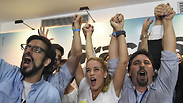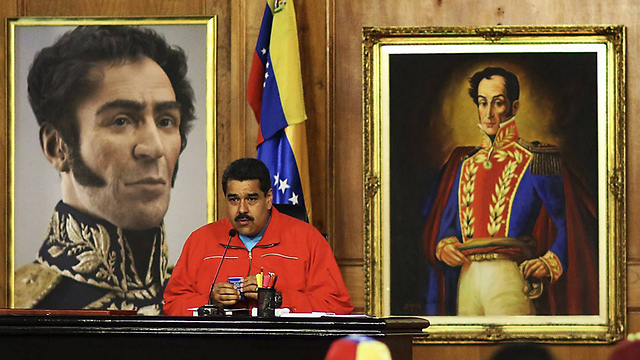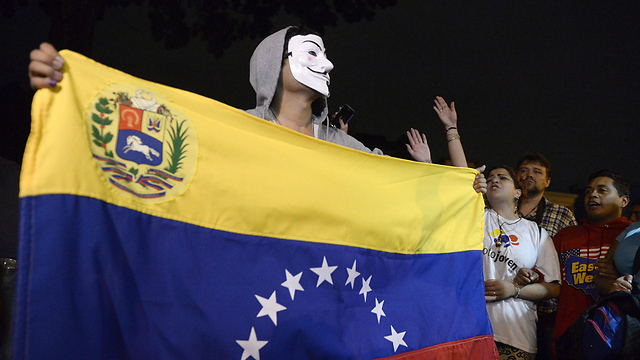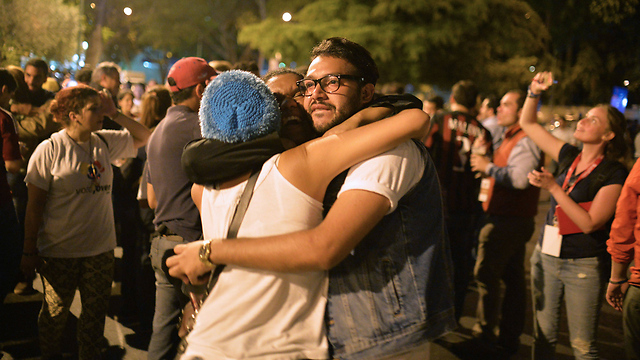
Venezuelans in Israel 'We finally have hope'
In a historic and groundbreaking vote on Sunday, the people of Venezuela rejected the country's ruling socialist party, which has been a close friend to Iran and openly hostile to Israel for years.
The opposition coalition won at least 99 seats in the incoming 167-seat legislature, electoral authorities announced after midnight Sunday. The ruling socialist party won 46 seats. The 19 remaining races remain up for grabs but if enough are won by the opposition it could give the coalition a two-thirds supermajority needed to strongly challenge President Nicolas Maduro's grip on power.
Within seconds, Maduro recognized the opposition's win, saying that despite an adverse result Venezuela's democracy had triumphed. But he recalled the long history of US-supported coups in Latin America in blaming the "circumstantial" loss on a conservative "counter revolution" trying to sabotage the oil-dependent economy and destabilize his rule,
"I can say today that the economic war has triumphed," Maduro, surrounded by his party's top leadership, said from the presidential palace.
Venezuelans living in Israel celebrated the vote after the win was announced. Bianca Sitzer, a Venezuelan Israeli told ynet, "My family voted for the opposition party. They did so because the country is in a really bad state. They were never fans of the government, but over time things just got that much worse. It was no longer a matter of political opinion, it was life or death."
"I think the vote reflects the will of the people, and even the government is starting to realize this. We need a better future, and this is not one the current government can provide," she said.
Adding that, "There is a lot of hope after the elections, like an awakening, we feel like maybe we can turn this country around and make a better tomorrow. It's going to take years and a lot of work. There are people who are committed to it, and we are hopeful."
Alan Cohen, another Venezuelan Israeli told ynet, "People or happy and hopeful, there is a feeling of euphoria. The next month will be the real test."
The opposition is likely to use its newfound leverage to pass an amnesty for dozens of opponents jailed during last year's protests. Some hardliners are vowing to seek a recall referendum to cut short Maduro's term before it ends in 2019.
But reining in Maduro, who became president after Chavez died in 2013, will be tough. Maduro's near-complete grip on other branches of government like the Supreme Court mean he can easily outflank a hostile congress. And some have already floated the idea that outgoing lawmakers can pass a law granting Maduro special decree powers to ride roughshod over the new congress, which won't be sworn in until January.
Their work will be easier if they obtain a two-thirds majority of 112 lawmakers -- still a possibility if enough of the undecided races break the opposition's way. Such a super majority would allow the congress to sack supreme court justices, pass major legislation and even convene a convention to rewrite Chavez's 1999 constitution.
Palestinian Connection
The Jewish community suffered greatly after the country's former leader Chavez rose to power. Which only intensified after the Israeli embassy in the country closed in 2008, during Operation Cast Lead. Many of the community's members fled to Spanish-speaking countries, the United States and to Israel as a result.
Emigration brought the Caracas Jewish community, which numbered 25,000 Jews in 1998, down to only 8,000. Today, Israel is home to 1,500 Venezuelan-Jews who reside mostly in Kfar Saba, Raanana, Shoham and Herzliya.
"Chavez's reign saw a new phenomena of xenophobia and hatred to Israel," says Sheryl Camper, who made aliyah in 1993. "The hostility towards Israel had a major effect on the community, and many Jews chose to emigrate. Without the Israeli embassy, Jews felt even more vulnerable."
Chavez, a self-designated leader of the developing world, was a vocal proponent of the Palestinians' right to statehood, which he saw as part of a broader battle against colonialism and the West.
"Today, Palestine enters the heart of Venezuela," the country's current leader Nicholas Maduro declared in November when he greeted the 119 Palestinian recipients of a medical school scholarship in Venezuela, adding that the historic exchange with a key ideological ally had made him cry.
The oil-rich South American country has also been a close ally and trading partner of Iran, a mere facet of its openly hostile stance towards Israel.














